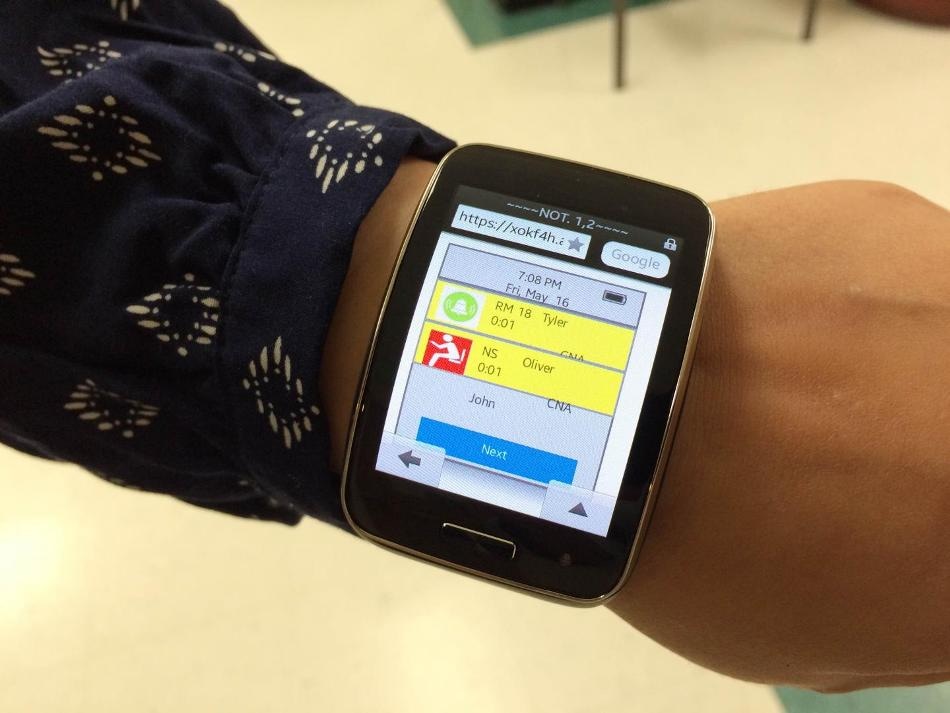Aug 2 2016
Poor communication systems at nursing homes can lead to serious injury for residents who are not tended to in a timely manner. A new smartwatch app being developed at Binghamton University could help certified nursing assistants (CNAs) respond to alerts more quickly and help prevent falls.
 Binghamton University researchers Assistant Professor of Systems Science and Industrial Engineering Huiyang Li and PhD candidate Haneen Ali are developing a smartwatch application to improve communication and notification systems for nursing homes, which are often faulty and inefficient. (CREDIT: John Brhel/Binghamton University)
Binghamton University researchers Assistant Professor of Systems Science and Industrial Engineering Huiyang Li and PhD candidate Haneen Ali are developing a smartwatch application to improve communication and notification systems for nursing homes, which are often faulty and inefficient. (CREDIT: John Brhel/Binghamton University)
Binghamton University researchers Assistant Professor of Systems Science and Industrial Engineering Huiyang Li and PhD candidate Haneen Ali are developing a smartwatch application to improve communication and notification systems for nursing homes, which are often faulty and inefficient. The proposed design integrates all of the existing safety systems at nursing homes -- e.g., call lights, chair and bed alarms, wander guards, calling-for-help functions -- and provides alerts to users. Through a process of iterative design and evaluation with prospective users, a final design was well received by nursing experts in geriatric care, and at local nursing homes. An on-going evaluation study shows that using this system reduces staff response time to alarms.
"The problem associated with not responding in time is that residents tend to stand up or go to the bathroom by themselves. If they're not strong enough, they can't support the weight. And if they have to wait, they will just get up and go. And that leads to falls," said Li. "We wanted to design a better system that improves notification and also, potentially, communication in nursing homes. The improvement of notification will potentially help staff to do a better job and, eventually, improve patient safety. Whenever residents need help, they have a way to call for help, and messages will be delivered to staff in an effective way."
Most nursing homes use a call light system, where residents push a button inside of their room to send an alert, and bed and chair pads with pressure sensors that send an alert when a resident sits or stands up. When nurses are working down the hallway, they might not hear or see these alerts.
"With our system, we provide an informative and customized message for different alarms. The message contains the resident's name, the type of alarm, the room number and the CNA who is responsible. The smartwatch will be on the CNA's wrist, so it's accessible all the time. They can see the message, hear the alarm, and feel the vibration, whether they are working down the hallway or inside the rooms," said Li.
Every CNA who uses the app sees a different display, as it is personalized to the user's specific task assignment. When CNAs start their shift, they will sign in and add their assigned residents. When a resident triggers an alert, a message will pop up on everyone's screen indicating who the resident is, their room number, and the type of alert (e.g., an exit from a chair).
"The alert message is more informative than the existing system and, at the same time, it will help nurses to prioritize. We will mark or highight alarms from residents who are actually assigned to whoever is using the app," said Li.
"The CNAs are exited about this idea and they are interested in this device. They would like to see the adoption of new technologies in their working environment because all of the problems in their current situation," said Ali.
Li and Ali hope to test the system in the future using a high-fidelity prototype at real nursing homes. While buying a smartwatch for every employee would be an added expense to nursing homes, the researchers believe that the benefits of this app would far outweigh the cost, particularly with the increasing availability of low-cost smartwatches.
"Falls, skin problems -- these kind of facility acquired conditions can cost a hospital a lot of money. If the system can actually reduce falls, reduce adverse events, improve patient safety, and also improve quality of care, hospitals will save money."
The paper, "Designing a Smart Watch Interface for a Notification and Communication System for Nursing Homes," was presented at the Human-Computer Interaction International Conference 2016.